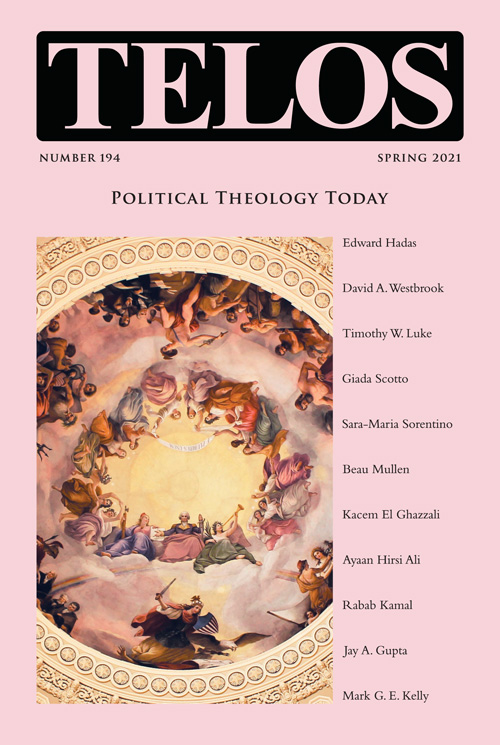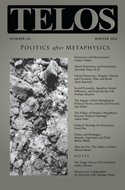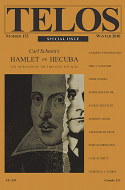By David Pan · Friday, March 19, 2021 Telos 194 (Spring 2021): Political Theology Today is now available for purchase in our store. Individual subscriptions to Telos are also available in both print and online formats.
 What does political theology mean today? At the Telos-Paul Piccone Institute conference from which many of the essays in this issue originated, a primary goal was to discuss the crisis of secular liberalism and “how faith is reshaping culture and politics today.” But even this project perhaps limits too much the scope of political theology, implying that we have a choice between reason and faith, or that political theology is a commitment to faith rather than an analysis of the element of faith that underlies all of our endeavors. The idea of political theology begins with the premise that every existing human order is built upon some understanding of ultimate meaning. The task would then be to analyze the kind of meaning that each existing order embodies and determine the kinds of decisions about meaning that are made and need to be made at various points in its history. Even secular liberalism, to the extent that it constitutes an existing order, presumes some answer to this question of meaning, and a closer look at the political theology of the United States reveals a mythic dimension that underlies its liberal democratic processes. The essays in this issue examine the political theological underpinnings of economy, politics, technology, and religion, laying out the ways in which these areas of human life develop not as autonomous spheres but as the result of struggles over a set of political theological choices. What does political theology mean today? At the Telos-Paul Piccone Institute conference from which many of the essays in this issue originated, a primary goal was to discuss the crisis of secular liberalism and “how faith is reshaping culture and politics today.” But even this project perhaps limits too much the scope of political theology, implying that we have a choice between reason and faith, or that political theology is a commitment to faith rather than an analysis of the element of faith that underlies all of our endeavors. The idea of political theology begins with the premise that every existing human order is built upon some understanding of ultimate meaning. The task would then be to analyze the kind of meaning that each existing order embodies and determine the kinds of decisions about meaning that are made and need to be made at various points in its history. Even secular liberalism, to the extent that it constitutes an existing order, presumes some answer to this question of meaning, and a closer look at the political theology of the United States reveals a mythic dimension that underlies its liberal democratic processes. The essays in this issue examine the political theological underpinnings of economy, politics, technology, and religion, laying out the ways in which these areas of human life develop not as autonomous spheres but as the result of struggles over a set of political theological choices.
Continue reading →
By Michael Marder · Wednesday, February 13, 2013 Michael Marder’s “After the Fire: The Politics of Ashes” appears in Telos 161 (Winter 2012). Read the full version online at the Telos Online website, or purchase a print copy of the issue in our store.
 Two fires are kindled at the threshold of the metaphysical era, and both are extinguished, almost simultaneously, as soon as metaphysics exhausts itself (or else gets exhausted, tired, fatigued with itself) in its final Nietzschean inversion. The political reality of the twenty-first century is, as a whole, a comet tail of these ancient blazes that, until recently, seemed to be older than time itself, gave the impression of being eternal, undying, inextinguishable. How to find one’s bearings among the cinders and ashes of what the flames consumed? How to make sense—if make sense we must—of the burnt and smoldering remains, the traces of catastrophes, as much as of hopes and revolutionary desires, littering the horizons of the political today? Two fires are kindled at the threshold of the metaphysical era, and both are extinguished, almost simultaneously, as soon as metaphysics exhausts itself (or else gets exhausted, tired, fatigued with itself) in its final Nietzschean inversion. The political reality of the twenty-first century is, as a whole, a comet tail of these ancient blazes that, until recently, seemed to be older than time itself, gave the impression of being eternal, undying, inextinguishable. How to find one’s bearings among the cinders and ashes of what the flames consumed? How to make sense—if make sense we must—of the burnt and smoldering remains, the traces of catastrophes, as much as of hopes and revolutionary desires, littering the horizons of the political today?
Continue reading →
By Charles Kollmer · Thursday, January 19, 2012 As an occasional feature on TELOSscope, we highlight a past Telos article whose critical insights continue to illuminate our thinking and challenge our assumptions. Today, Charles Kollmer looks at Stephanie Frank’s “Re-imagining the Public Sphere: Malebranche, Schmitt’s Hamlet, and the Lost Theater of Sovereignty,” from Telos 153 (Winter 2010).

In “Re-imagining the Public Sphere: Malebranche, Schmitt’s Hamlet, and the Lost Theater of Sovereignty,” Stephanie Frank outlines a compelling approach to Carl Schmitt’s complex oeuvre. She sets out to rectify a common mistake made in existing treatments of Schmitt; in studies of Schmitt’s early work Roman Catholicism and Political Form (1923), scholars tend to rely on a later work, Constitutional Theory (1928), as an explanatory crutch. Both texts model representation, but a conflation of their respective models obscures how Schmitt’s project changes between the works. As a corrective, Frank traces the nuances of Roman Catholicism‘s model back to the influence of seventeenth-century theologian Malebranche, who in turn influenced the eighteenth-century revolutionary Abbé Sieyès. By grounding Roman Catholicism in this historical context, Frank not only sidesteps the circularity of her colleagues’ interpretations but also lays the groundwork for a persuasive reading of Schmitt’s turn to aesthetics in Hamlet or Hecuba (1956).
Continue reading →
|
|
 What does political theology mean today? At the Telos-Paul Piccone Institute conference from which many of the essays in this issue originated, a primary goal was to discuss the crisis of secular liberalism and “how faith is reshaping culture and politics today.” But even this project perhaps limits too much the scope of political theology, implying that we have a choice between reason and faith, or that political theology is a commitment to faith rather than an analysis of the element of faith that underlies all of our endeavors. The idea of political theology begins with the premise that every existing human order is built upon some understanding of ultimate meaning. The task would then be to analyze the kind of meaning that each existing order embodies and determine the kinds of decisions about meaning that are made and need to be made at various points in its history. Even secular liberalism, to the extent that it constitutes an existing order, presumes some answer to this question of meaning, and a closer look at the political theology of the United States reveals a mythic dimension that underlies its liberal democratic processes. The essays in this issue examine the political theological underpinnings of economy, politics, technology, and religion, laying out the ways in which these areas of human life develop not as autonomous spheres but as the result of struggles over a set of political theological choices.
What does political theology mean today? At the Telos-Paul Piccone Institute conference from which many of the essays in this issue originated, a primary goal was to discuss the crisis of secular liberalism and “how faith is reshaping culture and politics today.” But even this project perhaps limits too much the scope of political theology, implying that we have a choice between reason and faith, or that political theology is a commitment to faith rather than an analysis of the element of faith that underlies all of our endeavors. The idea of political theology begins with the premise that every existing human order is built upon some understanding of ultimate meaning. The task would then be to analyze the kind of meaning that each existing order embodies and determine the kinds of decisions about meaning that are made and need to be made at various points in its history. Even secular liberalism, to the extent that it constitutes an existing order, presumes some answer to this question of meaning, and a closer look at the political theology of the United States reveals a mythic dimension that underlies its liberal democratic processes. The essays in this issue examine the political theological underpinnings of economy, politics, technology, and religion, laying out the ways in which these areas of human life develop not as autonomous spheres but as the result of struggles over a set of political theological choices.  Two fires are kindled at the threshold of the metaphysical era, and both are extinguished, almost simultaneously, as soon as metaphysics exhausts itself (or else gets exhausted, tired, fatigued with itself) in its final Nietzschean inversion. The political reality of the twenty-first century is, as a whole, a comet tail of these ancient blazes that, until recently, seemed to be older than time itself, gave the impression of being eternal, undying, inextinguishable. How to find one’s bearings among the cinders and ashes of what the flames consumed? How to make sense—if make sense we must—of the burnt and smoldering remains, the traces of catastrophes, as much as of hopes and revolutionary desires, littering the horizons of the political today?
Two fires are kindled at the threshold of the metaphysical era, and both are extinguished, almost simultaneously, as soon as metaphysics exhausts itself (or else gets exhausted, tired, fatigued with itself) in its final Nietzschean inversion. The political reality of the twenty-first century is, as a whole, a comet tail of these ancient blazes that, until recently, seemed to be older than time itself, gave the impression of being eternal, undying, inextinguishable. How to find one’s bearings among the cinders and ashes of what the flames consumed? How to make sense—if make sense we must—of the burnt and smoldering remains, the traces of catastrophes, as much as of hopes and revolutionary desires, littering the horizons of the political today? 


